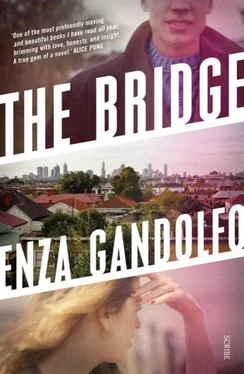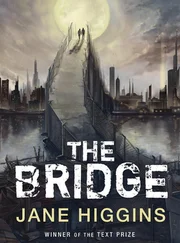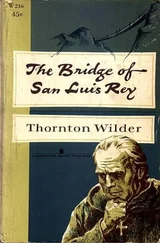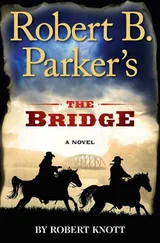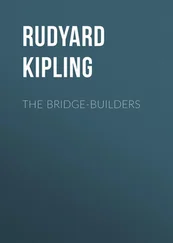‘How long have you been in Australia?’ Antonello asked Sam. ‘Your English is good.’
‘I’ve learnt English from Australian girls,’ Sam said, giving Antonello a wink. ‘Only Australian girls, that’s my rule. Italian girls are locked up by their parents until they get married and it’s too much trouble, all the sneaking around. Australian girls are friendly and sexy. They help me improve my English.’
Sam was short and muscular, and a charmer; women loved him. He was kind and compassionate, with a good sense of humour and a hearty laugh, and on the site, where there were often problems between the real Australians and the wogs, everyone liked Sam. He could turn the worst situation into a joke, and disarm the most racist and aggressive of the men.
He loved being a rigger, loved being up high. ‘You could’ve been a tightrope walker,’ Antonello said to him one day when they were both working on one of the spans.
Sam hurled himself in the air, somersaulted, landed on both feet, and took a bow.
‘ Disgraziato !’ Antonello cried out. ‘You are a bloody clown. I don’t want to be scraping you off the ground.’
‘Oh, don’t get so wound up. I wanted to be a gymnast when I was a kid. I used to do somersaults all the time. Planned to run away to the circus.’
Slav was the tallest of the three and the most serious. ‘I’m not Italian,’ he told them on that first day. ‘I was born in Yugoslavia, in the north, in a small town near the Italian border.’ He could speak several languages, including Italian and English. The son of primary-school teachers, he grew up in an educated, bookish household, but when his parents were killed in a ferry accident he, their only child, was shipped to Australia to live with his aunt. She took him in and loved and cared for him as she did her own children, but she and her husband worked long hours on the assembly line at the Ford factory and came home too tired to talk. There were no books in the house and little money; they expected their children and Slav to contribute to the household as soon as possible. In Yugoslavia, Slav’s parents wanted him to go into medicine or follow his love of literature. In Australia, those options slipped away, so he took up a carpentry apprenticeship. He wasn’t a bad carpenter, but he wasn’t a passionate one. He spent his money on books — novels and poetry. Sometimes he recited poems to Sam and Antonello, especially those of the Australian poets he made it his task to become familiar with: A.D. Hope, Bruce Dawe, and Judith Wright. Poets who wrote about the nature of life and death, who documented the lives of ordinary people and often used poetry to take up issues that troubled them — war, consumerism, and Indigenous land rights.
It was Sam who first called them the Rat Pack, one night when they were all dressed up in their suits, on their way to the San Remo Ballroom. ‘Handsome and always together. We have each other’s backs.’
In a parallel universe, they would’ve grown old together, and their friendship would’ve made him a stronger man, a better man.
As Antonello made his way back along the path, he caught sight of the roadside memorial for Ashleigh. There was a white cross, roughly made from two planks of wood. In thick black pen: Ashleigh Bassillo-White 20/09/2009. RIP. There were flowers — roses and lilies, already decaying. Tied and taped to the cross were several cards and notes, but Antonello didn’t bend down to read them. He assumed the memorial had been built by Ashleigh’s friends: the girls that were in the car, or maybe Ashleigh’s boyfriend, Kevin, or even Jo. Roadside memorials were common enough, along the freeways, on the sides of roads, attached to poles and posts, to cyclone fences, to roadside barricades. He avoided them, unless he was with Paolina; then, avoidance was impossible. To Paolina, these temporary altars were sacred places. She was compelled to stop, and if they couldn’t stop, she’d say a short prayer as they drove past, as if they’d passed the cemetery or a funeral procession. She said that some people believed the dead person’s spirit lingered where they took their last breath.
Did the dead exist anywhere? Were they watching? He’d grown up with heaven and hell and had discarded the idea of both, but Bob and Slav were often with him, and now Ashleigh too. Were they ghosts? Not the kind that appeared as thin ethereal apparitions in movies, not the kind he’d imagined as a child, draped with white sheets and the ability to walk through walls. But the kind that lodged themselves in your heart, and in your memories, the kind that came to you in dreams, that you could see when you closed your eyes and sometimes even when your eyes were opened, when a moment came back to you, their voices whispering in your ear, calling out your name. He felt the weight of their unlived lives, of all they might have been; he felt his own inadequacy.
He turned to look up at the bridge. He whispered to Bob and Slav to look after his granddaughter Ashleigh. Wherever she was, he hoped she was with them.
The Ashleigh portrayed in the newspaper articles after the accident bore little resemblance to the real Ash. They quoted the school principal: ‘Ashleigh was an exemplary member of the school community.’ In Ash’s school reports, none of the teachers called her exemplary . They quoted Mrs Zapatero, a neighbour, who cried during her interview: ‘She was quiet and kind.’ This was the same girl who had talked Jo into hacking Mrs Zapatero’s roses one night after the woman had complained to Rae about Ash’s bad language.
One of Ash’s uncles was quoted saying, ‘Jo was a bad influence on Ashleigh.’ An unnamed neighbour: ‘I hope that girl gets what she deserves.’
Ash wasn’t a saint. Jo longed to run up and down the streets of Yarraville screaming at them all, She’s no fucking saint.
Jo tore the articles out, shredded them into small, unreadable pieces, and stuffed them under her mattress. Ash wasn’t a bad person — she was funny, she was clever, she was never lost for words — but sometimes she was a bitch. Sometimes she was a cow. She could be nasty and mean. Say hurtful things.
But Ash was dead and Jo was alive, and even though she wished and wished, nothing could change that. She remembered the text messages sent anonymously the day after the accident: You should be dead. Murderer, scum of the earth , it should have been you who died.
The sender was right. She was a murderer, a criminal. Because of her, Ash was dead. Nothing would ever, ever change that. She could climb mountains, she could win medals, she could save the world from alien invasion, but she would still be a murderer.
You, climb mountains, win medals? Give me a break. I’m dead and you want sympathy.
‘No, I’m not asking for sympathy,’ Jo said out loud even though she knew Ash was not in the room.
The buzzing of a car alarm woke Jo. There was a moment or two in which she was only aware of her irritation at the relentless squawking. Every morning, she woke into her old life. For that first moment, Ash was alive. And then the anxiety, rising, swelling, erupting… remembering Ash. Ash dead. Ash dead.
Was every morning like this for Rae?
Rae was the only woman Jo had ever seen naked. It was during a sleepover at Ash’s house. She had stumbled out of bed in the middle of the night to go to the toilet and almost collided with Rae.
‘Oh, sorry, Jo,’ Rae said. ‘I forgot you were staying over. Forgot to put on the dressing gown.’
‘Oh, just going to the…’ Jo said, embarrassed and not sure whether to backtrack to the bedroom or keep going.
‘Go, no problem,’ Rae said. Even though Mandy and Jo were the only occupants of their house, neither of them ever left their rooms without clothes. Rae was lean and fit, with large breasts; she wasn’t embarrassed to be seen naked. When Jo had imagined herself as an adult woman, she imagined herself as Rae.
Читать дальше
